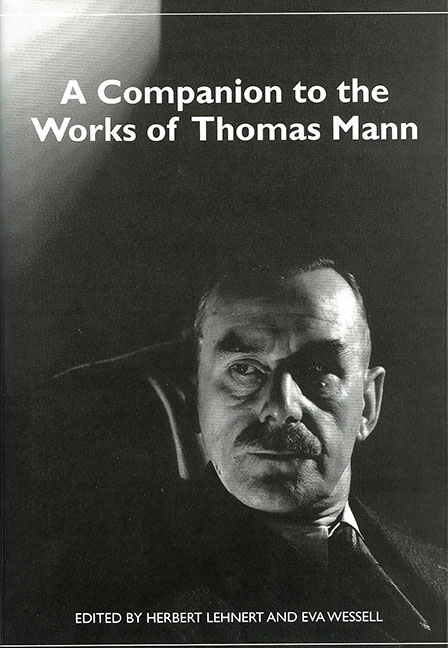Book contents
- Frontmatter
- Contents
- Foreword
- Thomas Mann's Works
- List of Abbreviations
- Introduction
- Thomas Mann's Beginnings and Buddenbrooks
- Art and Society in Thomas Mann's Early Novellas
- Love in Society: Thomas Mann's Early Stories
- “Death in Venice”
- “Mein ‘Friedrich’ — das ist was Anderes”: Thomas Mann's Unwritten Novel about Frederick the Great, King of Prussia
- Magic and Reflections: Thomas Mann's The Magic Mountain and His War Essays
- Thomas Mann's “Autobiographical” Stories
- Joseph and His Brothers
- Lotte in Weimar
- Thomas Mann's Late Politics
- “German” Music and German Catastrophe: A Re-Reading of Doktor Faustus
- The Gaze of Love, Longing, and Desire in Thomas Mann's “The Transposed Heads” and “The Black Swan”
- Felix Krull
- Female Identities and Autobiographical Impulses in Thomas Mann's Work
- Betrayed or Not Betrayed: A Testament?
- Thomas Mann's Comedies
- Notes on the Contributors
- Select Bibliography
- Index
Joseph and His Brothers
Published online by Cambridge University Press: 28 April 2017
- Frontmatter
- Contents
- Foreword
- Thomas Mann's Works
- List of Abbreviations
- Introduction
- Thomas Mann's Beginnings and Buddenbrooks
- Art and Society in Thomas Mann's Early Novellas
- Love in Society: Thomas Mann's Early Stories
- “Death in Venice”
- “Mein ‘Friedrich’ — das ist was Anderes”: Thomas Mann's Unwritten Novel about Frederick the Great, King of Prussia
- Magic and Reflections: Thomas Mann's The Magic Mountain and His War Essays
- Thomas Mann's “Autobiographical” Stories
- Joseph and His Brothers
- Lotte in Weimar
- Thomas Mann's Late Politics
- “German” Music and German Catastrophe: A Re-Reading of Doktor Faustus
- The Gaze of Love, Longing, and Desire in Thomas Mann's “The Transposed Heads” and “The Black Swan”
- Felix Krull
- Female Identities and Autobiographical Impulses in Thomas Mann's Work
- Betrayed or Not Betrayed: A Testament?
- Thomas Mann's Comedies
- Notes on the Contributors
- Select Bibliography
- Index
Summary
The four parts OF the Joseph novels appeared between 1933 and 1943. Thomas Mann wrote the first three volumes in Munich and Switzerland; he completed the last in the United States, in exile. The entire work was published in 1948 under the title Joseph und seine Brüder (Joseph and His Brothers). In contrast to the novel Doktor Faustus (1947), the grand composition of nearly two thousand printed pages does not owe its existence to plans conceived long ago but to a chance event: an invitation to contribute something written to a collection of pictures the painter Hermann Ebers planned to dedicate to the biblical stories of Joseph.
Mann's main source for the novels is the Book of Genesis, especially chapters twenty-one to thirty, covering the period from the birth of Isaac, Jacob's father, to the death of Joseph. In a wider sense, however, the story relies on the entire biblical narrative, especially if one takes the many typo-logical references between the Old and the New Testament into account. One example will suffice for many: Joseph spends three days in the well; Jesus spends as much time in his tomb. The covered time in the novels stretches even further. If one considers both prologues, the “Höllenfahrt” (Descent into Hell) preceding the first novel and “In oberen Rängen” (In the Upper Levels) at the beginning of the last, then the narrative includes the entire biblical history of humankind, from the time of creation and Lucifer's rebellion to Thomas Mann's own time. This does not only involve contemporary social and economic events, as we find in the parallel between Roosevelt's New Deal and Joseph's actions as the “provider,” but the novels also comment on the anti-Semitism rampant in Germany at the time, countered in the Joseph novels with a dignified image of the Jewish people. While the narrated time in Buddenbrooks (1901) covers little more than forty years, in Der Zauberberg (The Magic Mountain, 1924) only seven, time in the Joseph novels reaches back into an immeasurable pre-history when there was nothing on earth, because the earth did not yet exist. Time is in effect plumbed in these novels, whereby the plumbing device vanishes in fathomless depths. The idea that space and time, as well as being and appearance, may be interchangeable marks the representational style of the entire tetralogy.
- Type
- Chapter
- Information
- A Companion to the Works of Thomas Mann , pp. 159 - 180Publisher: Boydell & BrewerPrint publication year: 2004

